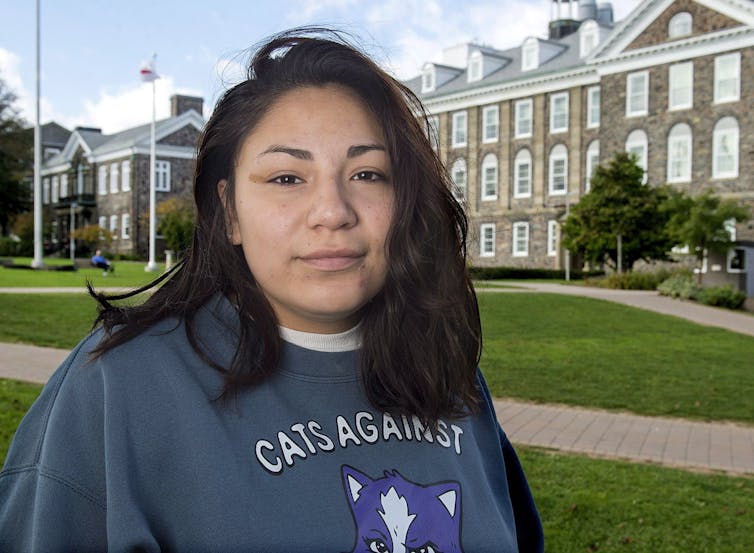Canadá/Noviembre de 2017/Fuente: The Conversation
Resumen: «¡Siempre indigeniza!» Fue el grito de guerra de un artículo escrito por el académico canadiense Len Findlay hace casi 20 años. Fue visto por muchos en ese momento como un paso adelante radical pero indescriptiblemente positivo, una forma de hacer que las universidades sean más justas y diversas.
Este esfuerzo por autorigenizar a las universidades continúa siendo respaldado por muchos administradores y académicos bien intencionados. Tras el lanzamiento del informe final de la Comisión de la Verdad y la Reconciliación, este impulso de indigenizar ha adquirido un sentido de urgencia.
Always indigenize!” was the rallying cry of an article written by Canadian academic Len Findlay nearly 20 years ago. It was seen by many at the time as a radical but unassailably positive step forward — a way to make universities more just and more diverse.
This effort to indigenize universities continues to be supported by many well-meaning administrators and scholars. Following the release of the Truth and Reconciliation Commission’s final report, this push to indigenize has gained a sense of urgency.
Just this month, the University of Calgary was the latest higher education institution to unveil its new Indigenous Strategy, ii’ taa’ poh’ to’ p. In September, the University of Saskatchewan hit the headlines when some professors questioned a radical plan to indigenize the curriculum for 21,000 students.
Part of the reason for this quick adoption is, I believe, because it feels good. Many Canadians want to do something about our shameful history and “fix” our colonial past to make Canada more just, more equitable.
We’re doing it, we’re ‘indigenizing’
At the end of October, I attended the Society for Ethnomusicology’s annual conference in Denver. The conference included a day-long symposium on Indigenous musics, and many roundtables and papers on indigeneity and decolonization.
My own research focuses on Métis cultural festivals as sites of resurgence. I have also written about settler appropriation of Métis music, and the ways in which acts of inclusion function to control and contain Métis music. As such, I was interested in how calls to indigenize were being met or otherwise addressed by scholars in my discipline.
As one of a small group of Canadian music scholars in attendance, I found the differences between Canada and the United States to be palpable: Canadians, unlike Americans, have made territorial acknowledgements common and even expected at public gatherings. Americans, I found, seemed more hesitant to embrace this practice.
Canadian educators are starting to discuss and include Indigenous histories, methodologies and worldviews in their teaching practice. And Canadian universities are trying to address the lack of Indigenous faculty members through open calls for applications from Indigenous scholars.
Seeing these differences, it was hard not to get caught up in the excitement and feel a sense of pride in our achievements as Canadians. We’re doing it. We’re “indigenizing.”
Wait, isn’t this just good teaching?
And we should feel proud — at least a little. These small initiatives are positive. We should be constantly reminding ourselves and others of whose lands we are occupying. We should be making sure Indigenous scholars are a valued part of universities, and that students see themselves in their instructors. We should be teaching Indigenous histories. We should be valuing Indigenous worldviews.
We should make sure that Indigenous students receive the supports — financial and other — needed to finish their programs of study. We should be adopting methods of teaching that are more hands on and experiential. We should be doing research with Indigenous communities. We should be restructuring the tenure system so that community work is better supported and acknowledged. We need to unearth the systemic racism that exists on campus. And I could go on.

Also, the initiatives brought forward under the rhetoric of indigenizing the academy are not new — educators and researchers have been raising these issues for decades as evident in the work of Marie Battiste. The “initiatives” are actually just best practices for teaching and research.
Many educators have long-called for more equity and diversity in professorship, teaching practices, curriculum content, and learning and assessment . These calls aim to make educational systems better serve a diverse group of students, whether Indigenous students, racialized ones or students with disabilities.
Furthermore, ethics boards at universities work diligently to guide researchers so that possible harms to communities are reduced and research benefits optimized, something that, whenever applicable, includes community consultations and partnerships. None of this is new.
Dangerous opportunities
Why are we calling this “indigenizing” when really we’re just trying to do what’s right? In other words, isn’t teaching about Indigenous histories simply teaching a more complete history? Isn’t making sure that we use examples that Indigenous students can relate to just good teaching?
I’m also struck by the general lack of discussion about what it means to indigenize the academy. The effort to indigenize universities is, as such, being done with little critical engagement with what “indigenization” might involve, especially if it is to benefit Indigenous nations.
The miraculous possibility is unlikely to say the least. The dangerous possibility — to make indigenous — is eerily similar to a growing trend of “settler self-indigenization” whereby settlers with no prior connection to an Indigenous community become Indigenous. If universities claim to be indigenizing, how might this affect our understanding of Indigenous nations as separate from the Canadian state?
Universities as colonizers
Hill most poignantly asks, “Could there be instances in the end where…Indigenous people are not even necessary for indigenizing?”
This question might seem, at first glance, to be pushing the argument to the absurd. However, given that advocates for indigenization constantly reiterate that doing so is good for universities, it might be exactly on point.
Ultimately, much of what has happened around indigenizing the academy has been aimed at making the university — a settler institution — a better system. As Hill says, this creates “a better kind of university, with knowledge toward a better kind of still colonial Canada.” That the term indigenous — and indeed the verb to indigenize — does not need to refer to Indigenous peoples (that is, distinct nations) should not be forgotten.
Indigenizing as it is now practiced is largely good — for settlers, and perhaps for individual Indigenous students.
But it comes with a profound risk: Will Indigenous nations lose control over their intellectual property? Over how their traditions are taught and written? Will universities continue to facilitate colonization, reinforcing the belief that all that is worth knowing, all intellectual traditions, are, or should be, centred within the university?
Instead of working in their communities, will elders be asked to put their time and energy into supporting settler faculty as they attempt to “indigenize”?
True reparation will be painful
It should be clear by now that I don’t think “indigenizing” is the right approach to addressing Canada’s colonialism within universities. But if not indigenizing, what should we be doing as academics, as university administrators, as Canadians?
The question we need to consider is: In what ways have the university system and academic traditions harmed Indigenous nations, and how can we begin the process of reparation?
The first step is to start listening, listening to Indigenous scholars and to Indigenous nations on whose lands our universities stand. As such, I don’t have answers. I can’t tell you, or tell academic institutions across Canada, what needs to happen because knowing will require long-term, on-going engagement with Indigenous communities.
But I do know that reparation can’t be centred on universities, or on the needs of settler-colonizers. In fact, reparation will likely be painful for settlers because it will be profoundly unsettling.
If it feels good, if it feels easy, if it feels comfortable, we’re not doing it right.
Fuente: http://theconversation.com/if-indigenizing-education-feels-this-good-we-arent-doing-it-right-87166







 Users Today : 49
Users Today : 49 Total Users : 35460066
Total Users : 35460066 Views Today : 66
Views Today : 66 Total views : 3418697
Total views : 3418697